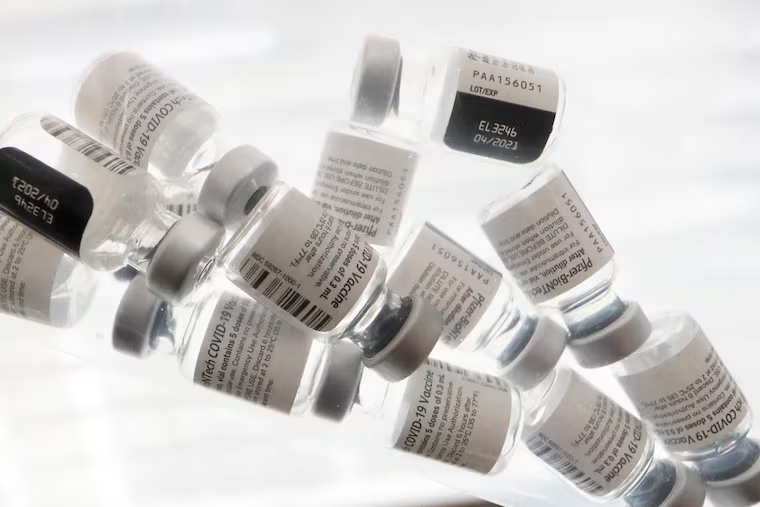Pfizer COVID-19 vaccine for kids and teens: Safety and side effects, explained
The U.S. Food and Drug Administration is expected to issue an emergency use authorization for Pfizer’s COVID-19 vaccine among children ages 12 to 15 next week.

Parents and teens may be excited about the possibility of a COVID-19 vaccine soon becoming available for children age 12 and older — but, understandably, they may also have a lot of questions.
The Food and Drug Administration is expected to expand the emergency use authorization for Pfizer’s COVID-19 vaccine to include children ages 12 to 15 next week.
Pfizer’s two-dose vaccine is currently available for people 16 years and older. People 18 and older can get Moderna’s two-dose vaccine or the single-dose Johnson & Johnson vaccine.
Here’s what parents should know about COVID-19 vaccines for children:
What is an emergency use authorization? Is the vaccine safe?
Emergency use authorizations (EUA) are used during public health emergencies to make available a needed drug or vaccine before the FDA has all the information normally required for approval of a new product. Developers must prove that the benefits of the vaccine outweigh the known and potential risks.
The COVID-19 vaccines that have received EUAs have gone through extensive clinical testing with tens of thousands of study volunteers. The FDA requires developers to submit detailed findings about safety, and follow clinical trial participants for at least two months after the trial ends to monitor for potential side effects.
Once the FDA authorizes emergency use of Pfizer’s vaccine among 12- to 15-year-olds, a federal drug advisory panel will review the case and make a recommendation to the Centers for Disease Control and Prevention about whether the vaccine should be offered to children.
What did the clinical trials find about the vaccine’s efficacy among children?
In March, Pfizer reported results from a study with 2,260 children ages 12 to 15. None who received the vaccine contracted COVID-19. There were 18 cases of COVID-19 among children who received the placebo.
That doesn’t necessarily mean the vaccine is 100% effective among children.
“Nothing is 100% effective,” said Paul Offit, director of the Vaccine Education Center at the Children’s Hospital of Philadelphia and a member of the FDA’s Vaccine Advisory Committee. “But you can say with confidence it is highly effective.”
Based on the trials, the vaccine appears to be as effective among children as it is among adults.
Do kids experience different side effects than adults?
Pfizer has reported that children experience similar side effects. The most common are pain at the injection site, fatigue, headache, muscle pain, chills, joint pain, and fever. Side effects generally subside in 24 hours.
If children are less likely to get sick from COVID-19, why do they need a vaccine?
Children can get sick from COVID-19, especially as new, more contagious strains of the virus begin to spread. New strains have also been associated with higher rates of illness among children, said Stanley H. Weiss, an epidemiologist and professor at the Rutgers New Jersey Medical School and the Rutgers School of Public Health.
Children who get the vaccine protect themselves from getting sick and help reduce the virus’ spread to others, including parents and grandparents, who are more at risk of severe COVID-19.
What if my teen already had COVID-19. Should they get the vaccine?
There are no data on this specific to children, though the FDA will likely address this question when it releases its recommendations for the vaccine among adolescents. Among adults, the vaccine is recommended even for those who were previously sick with COVID-19. Vaccination can protect against reinfection, which is rare, and so far the vaccines have been effective against more transmissible strains of the virus, Weiss said.
Experts aren’t sure how long natural immunity after infection lasts. Studies suggest vaccination provides stronger, longer protection than natural infection, but how much is not yet clear.
Can my child get the COVID-19 at the same time as other routine vaccines?
No. Typically new vaccines are tested for their compatibility with other common immunizations. But COVID-19 vaccines are being tested in isolation, which means regulators do not know how they interact with other vaccines. COVID-19 vaccines should be given at least a month apart from any other vaccine, Offit said.
Will the COVID-19 vaccine affect my child’s fertility in the future?
There is no evidence to support this canard, spread by anti-vaccine groups. Pregnant people were not included in vaccine trials. However, the CDC in April recommended vaccination for pregnant people following a study that found no increased rate of preterm birth, miscarriage, or stillbirth among people who opted to get the vaccine while pregnant.
Will students be required to get the COVID-19 vaccine to attend school or play sports?
Pennsylvania has not indicated that it will require children to be vaccinated against COVID-19 to attend school. Maggi Barton, a spokesperson for the Pennsylvania Department of Health, said the department would “continue to closely monitor the evolving information and watch for federal guidance on vaccinating kids between 12 and 15 years old.”
New Jersey is not currently requiring the vaccine for school attendance.
When will the vaccine become available for children under age 12?
Pfizer and Moderna both have trials in progress to evaluate the vaccine’s efficacy among children as young as 6 months old. Children’s Hospital of Philadelphia is part of Moderna’s trial in children.
Pfizer said on a quarterly earnings call Tuesday that it expects to apply for authorization among children ages 2 to 11 in September.
How soon the vaccine can be made available to younger children will depend on the outcomes of these studies.
Staff writer Maddie Hanna contributed to this article.
» READ MORE: Our best COVID-19 tips: Read our most useful articles